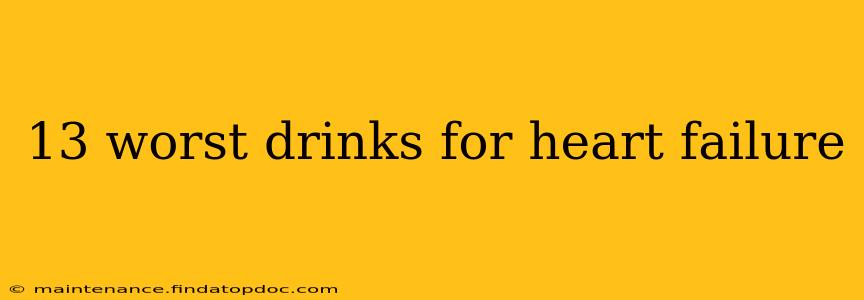Heart failure, a serious condition affecting millions, requires careful management of diet and lifestyle. While medication and regular check-ups are crucial, what you drink plays a significant role in your overall heart health. Certain beverages can exacerbate symptoms and put extra strain on your already weakened heart. This article explores 13 drinks to avoid if you have heart failure, highlighting their detrimental effects and offering healthier alternatives.
Understanding the Impact of Drinks on Heart Failure
Before diving into the specific drinks, it's crucial to understand why hydration and beverage choice are so critical for individuals with heart failure. Heart failure reduces the heart's ability to pump blood effectively, leading to fluid buildup (edema) in the body. Consuming drinks high in sodium, sugar, or caffeine can worsen this fluid retention and put added stress on the heart.
The 13 Drinks to Limit or Avoid with Heart Failure
Here are 13 drinks that should be limited or avoided if you have heart failure:
1. Sugary Sodas and Juices: These drinks are loaded with added sugars, contributing to weight gain, high blood pressure, and increased risk of type 2 diabetes – all significant risk factors for heart failure. The extra sugar burden also forces your kidneys to work harder.
2. Sweetened Iced Teas: While unsweetened iced tea can be a healthy choice, many commercially available versions are packed with sugar, mirroring the issues of sugary sodas and juices.
3. Energy Drinks: These drinks often contain high levels of caffeine, sugar, and other stimulants that can increase heart rate and blood pressure, putting undue strain on a weakened heart.
4. Alcoholic Beverages: Excessive alcohol consumption can weaken the heart muscle and increase blood pressure, significantly worsening heart failure symptoms. Even moderate consumption may need to be adjusted based on individual circumstances and physician recommendations.
5. Sports Drinks: Although marketed for athletes, many sports drinks are high in sugar and sodium, contributing to fluid retention and worsening heart failure symptoms.
6. Highly Caffeinated Coffee: While moderate coffee consumption might be acceptable for some, excessive caffeine intake can raise blood pressure and heart rate, potentially worsening heart failure.
7. Fruit Punches (Many Store-Bought Varieties): Similar to sugary sodas and juices, many store-bought fruit punches contain excessive amounts of added sugar, leading to the same detrimental effects.
8. Flavored Milk: Many flavored milks contain added sugars and are high in calories, promoting weight gain and exacerbating heart failure.
9. Soda Water with Excessive Sweeteners: While plain soda water can be a healthy alternative, many individuals add excessive sweeteners, negating its benefits.
10. Creamy Coffee Drinks: These drinks often contain high levels of sugar, fat, and calories, increasing the risk of weight gain and worsening heart failure symptoms.
11. Sweetened Hot Chocolate: Like many other sweetened beverages, hot chocolate often contains high levels of sugar and added calories.
12. Protein Shakes with Added Sugars: While protein is important, many protein shakes are loaded with added sugar, nullifying their benefits and contributing to weight gain.
13. Certain Fruit Juices (High Sugar Content): While some fruit juices contain vitamins and minerals, many contain high levels of sugar. It is crucial to check labels and consume them in moderation, if at all.
Frequently Asked Questions
What drinks are best for people with heart failure? Water is your best bet! Unsweetened tea (in moderation) and diluted fruit juices are acceptable options, but always check sugar content. Your doctor can provide personalized hydration recommendations based on your specific needs.
How much water should I drink with heart failure? There's no one-size-fits-all answer. Your doctor will help determine the appropriate fluid intake for you based on your individual condition and symptoms.
Can I drink alcohol with heart failure? Alcohol consumption should be discussed with your doctor. They can advise on safe limits, if any, based on your specific health circumstances.
What are the signs of fluid overload in heart failure? Fluid overload symptoms can include swelling in the legs, ankles, and feet, shortness of breath, weight gain, and fatigue.
Disclaimer: This information is for educational purposes only and does not constitute medical advice. Always consult your doctor or a registered dietitian before making any changes to your diet, especially if you have heart failure. They can provide personalized guidance based on your individual health needs and condition.
